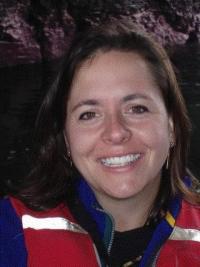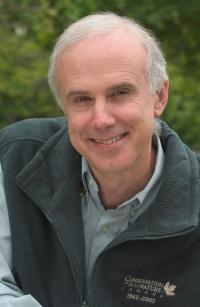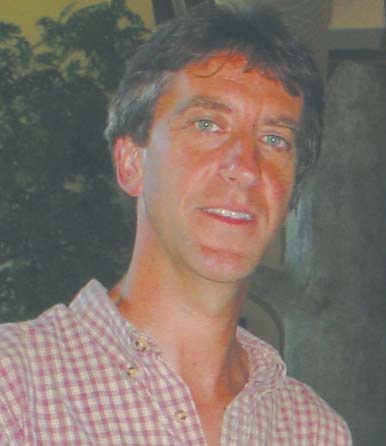[accordion-wrap][accordion title=”Keeping Leaders in the Movement”]
 Meet ICL Executive Director Leadership Program Alumnae, Tonya Graham
Meet ICL Executive Director Leadership Program Alumnae, Tonya Graham
Tonya Graham, Executive Director of Geos Institue in Ashland, OR, is an energetic and committed leader in a field that is trying to solve the world’s most immense and intractable environmental dilemma – global climate change. At the Geos Institute, Tonya has developed an innovative way to bring the issue home: helping local communities prepare for climate change.
The Geos Institute provides research and advocacy on climate change, and works to protect the temperate rainforests that are a key part of our planet’s ability to sequester carbon.
“I came into contact with ICL when I was a brand new executive director,” recalls Tonya.
She was recognized for her raw talent for development, after starting her career as a volunteer hanging posters around town. Then, she became an executive director, with responsibilities that include fundraising, but also managing personnel, strategic planning, financial management, board relations.
“It was an incredible variety of tasks that I didn’t understand,” recalls Tonya. The Executive Director Leadership Program at ICL helped Tonya realize that organizations go through natural life cycles, and there are different tools to address the challenges at each stage.
“It gave me concrete information and knowledge about the various aspects of being an executive director,” says Tonya. “If I had to stumble through that on my own, I would probably not be an executive director today or even have stayed in the conservation field.”
Now, Tonya feels at ease in her role as she expands programs and works directly with communities on climate change issues. She has eight ClimateWise® projects finished or underway, working on the tough issues of adjusting to a changing climate – managing water for fish, communities and farmers, adapting to new flood cycles, and reducing greenhouse gas pollution. At the same time, The Geos Institute is working on managing forests to sequester more carbon, especially in temperate rainforests.
“The experience with ICL made me understand that all the struggles I was having as a new ED were the struggles that everybody goes through. And, now I have a way forward.”
[/accordion][accordion title=”Phenomenal Growth at Nature Conservancy of Canada”]
 Meet ICL Executive Director Leadership Program Alumnae, John Lounds
Meet ICL Executive Director Leadership Program Alumnae, John Lounds
John Lounds took the helm of the Nature Conservancy of Canada in 1997, when the 35-year old organization had a staff of 27 and a budget of $8m. Under his leadership, the organization has grown to a staff of 200 and a budget of $100m per year.
“I have had to relearn my role and my job every few years because of that growth,” reflects John. Just recently, the Nature Conservancy of Canada completed its largest project ever: protection of 136,400 acres of forest land in British Columbia that is habitat for Mountain Caribou.
What has been the secret to his success? Like many of the world’s best leaders, John points to those around him. “I have a very energetic board of directors, and I have a great staff team,” says John. He enjoyed getting together with other executive directors at ICL to talk about the unique role of the ED as the “fulcrum between staff and board.” He has fashioned himself as the “keeper of the process,” and does not try to control everything. “I find that the dynamic tension between board and staff, well managed, is where you get creativity, energy, fundraising and growth.”
John has participated in ICL programs over the years, such as Executive Director Leadership and Leading from Within, consistent with his style of constantly learning and growing.
“ICL helped me focus on the difference between the important and the urgent,” says John. “You can get caught up in the hurly burly of the issues you are dealing with. Unless you take time to reflect and take time for yourself, you can’t actually do the job well enough. For me, just going on the course forced me to reflect.”
“The Institute played an important role in my life and career. I think it is wonderful that an organization like ICL was created and exists.”
[/accordion][accordion title=”Gulf Restoration Network: Ready from Day One”]
 Meet ICL Executive Director Leadership Program Alumnae, Cynthia Sarthou
Meet ICL Executive Director Leadership Program Alumnae, Cynthia Sarthou
Cynthia, executive director of the Gulf Restoration Network (GRN) in New Orleans, LA, is no stranger to crisis. When the BP oil spill hit the Gulf, Cynthia and her organization were ready for action.
“Sadly, Hurricane Katrina prepared us for this,” she says. “We had already ramped up our monitoring capability and advocacy roles.”
Now, GRN is a central player in independently monitoring the release of oil and the clean-up efforts. “We have been out there since day one,” says Cynthia, as they work to try to determine the impact of the spill and the efficacy of the clean-up work that is being done. GRN is also urging congressional action to increase regulation and change the way the oil and gas industry do business.
Prior to being an executive director, Cynthia was a campaign director with experience as a litigator. She led successful campaigns to reduce wetlands losses in Louisiana and Mississippi and force EPA to start addressing the Dead Zone in the Gulf of Mexico. “When I transitioned to being an executive director, it was clear to me that I didn’t have the training,” said Cynthia. “I was an advocate, an activist.”
That was when a colleague from the Environmental Support Center recommended ICL’s Executive Director Leadership Program. “I learned what I needed to do as an executive director, and I learned that running an organization is like running a business,” says Cynthia. She followed the advice she got at ICL, and “because of that, Gulf Restoration Network is pretty effective.” Indeed, under her tenure, the organization has grown from 2 people to 14. She has relied on ICL not only for her own professional development, but she also sends her staff to ICL programs such as Leading From Within.
Cynthia points out that in order for environmental organizations to be effective, their leaders must be “very focused on the health of the organization itself, even if that means sometimes sacrificing my time for the issue work that is the love of my life. I understand that that is my role. ICL taught me that.”
[/accordion][accordion title=”Nature Center Plants Seeds for Future Sustainability”]
 Meet ICL Executive Director Leadership Program Alumnae, Brian Winslow
Meet ICL Executive Director Leadership Program Alumnae, Brian Winslow
The Asbury Woods Nature Center, owned by Millcreek Township School District near Erie, Pennsylvania, recently completed a 10-year capital campaign that resulted in a new green building and miles of refurbished nature trails. Brian Winslow, director of the Center, realized that after good work on that vision, the Center needed to plan for the future.
A capacity building grant provided by a local community foundation provided that chance. The foundation suggested that they work with experts in their field, not just any local consultant, to create a new strategic plan. The staff had attended ICL workshops, and selected ICL to facilitate the rich conversation about current
organizational issues.
“Sometimes you have to deal with challenges straight on,” said Brian Winslow. “One route was to stay under the radar, but instead we decided to directly address weaknesses and threats.” Through the strategic plan, the Nature Center chose to spin off a new nonprofit organization to raise funds, and created a new agreement with the school district to create a foundation for future sustainability and growth.
“With the help of ICL we put the key issues on the table to allow the leadership to deal with them. This is always best in the long run, even if it is difficult in the short run.”
[/accordion][/accordion-wrap]
